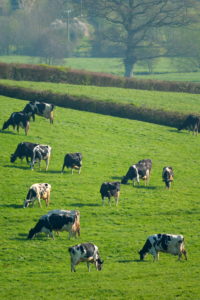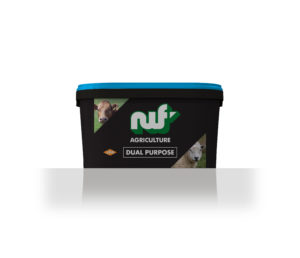As dairy cows are out at grass or due to be turned out it is important to remember that grazed grass is a variable source of minerals, with levels directly dependent on the mineral content of soils. Typically, some levels will be in short supply giving rise to potential deficiencies whilst others can be present at high levels and cause issues with antagonism. A deficiency or oversupply of any mineral will potentially compromise a number of metabolic functions and reduce performance from grazing. Therefore, it is vital to ensure correct levels are fed, with consideration of the different types of supplementations and which best suits individual farms and systems.
Types of Supplementation:
Supplementation of minerals can occur in various forms.
- Free access minerals or free access mineralised buckets depend upon voluntary intake. As a result, it is important that enough minerals are provided per head of stock and intakes must be monitored.
- The supplementation of in-feed minerals requires cows to have access to forage or TMR at points during the day. With this approach it is important that ample time and adequate headspace is provided, ensuring all cows receive sufficient mineral intakes.
- When supplementing with compound feed, it is important to consider appropriate mineral inclusion for the given feed rate to meet requirements and maintain a balanced ration.

Why is supplementation of minerals important?
The addition of other additives such as yeasts or buffers can help reduce the risk of sub-acute ruminal acidosis and clinical ruminal acidosis on lush, high protein, low physical fibre diets. By maintaining rumen pH, the animals can better maintain dry matter intakes and consequently maintain performance throughout the grazing period. These additives can be added to farm minerals for a convenient supplementation solution to grazing animals. Regardless of what type of supplementation is used, it is important to monitor levels provided to dairy cows to ensure requirements are met and deficiencies (for example Magnesium deficiency) and toxicities are avoided.
Magnesium supplementation:
Magnesium (Mg) levels at grass are one of the most important things to address at turnout, particularly in early lactation. The primary functions of magnesium are bone growth and maintenance, but also plays a significant role in nervous response and calcium metabolism. Deficiency may manifest predominantly as hypomagnesaemia (grass tetany or lactation tetany). Clinical symptoms of grass tetany progress over a period of 12 to 24 hours due to the cow’s inability to store magnesium.
The following factors reduce magnesium absorption and increase the risk of grass tetany:
- High levels of Potassium (from manure or fertilisers) which is an antagonist of magnesium
- Excess nitrogen in the rumen, common with fresh grass
- Low dry matter intakes in pastures
- Flushes of grass growth and rapid changes in nutrient profiles of grass in spring and autumn
Therefore, a source of magnesium must always be available, this can be through magnesium dosing in water, supplementary feed, for example, NWF Grazemore which contains an increased level of magnesium, powdered minerals such as NWF UltraMin Cattle Hi Mag, or buckets/blocks.
Phosphorus and Pica:
Pica is an abnormal behaviour seen in ruminant species that involves licking or chewing inedible materials, such as eating stones and/or licking soil. The behaviour can have detrimental effects as it can risk the ingestion of foreign objects and potentially undesirable bacteria, both of which can damage the gut. The exact cause of Pica is not known, however, imbalances and deficiencies of phosphorus (P), sodium (Na) and cobalt (Co) have been shown to have a connection to Pica.
The phosphorus status of pastures varies widely and is influenced primarily by the phosphorus status of the soil, the stage of maturity of the plant and the climate. A reduction in phosphorus can affect the performance of animals and lead to Pica behaviour. It is also important to remember to check dry matter intakes, a drop in assumed dry matter intakes will impact the background mineral levels a cow is receiving, thus predisposing the animal to deficiencies.
Mineral analyses of feed and soil can help identify any deficiencies on farm. Once detected, NWF Agriculture have solutions available to help rectify imbalances short term with correct feed and mineral supplementation, and in the longer term for the soil and pasture itself.
For more information on our mineral ranges, please speak to your NWF Sales Specialist, shop our mineral range or get in touch on 0800 756 2787.

